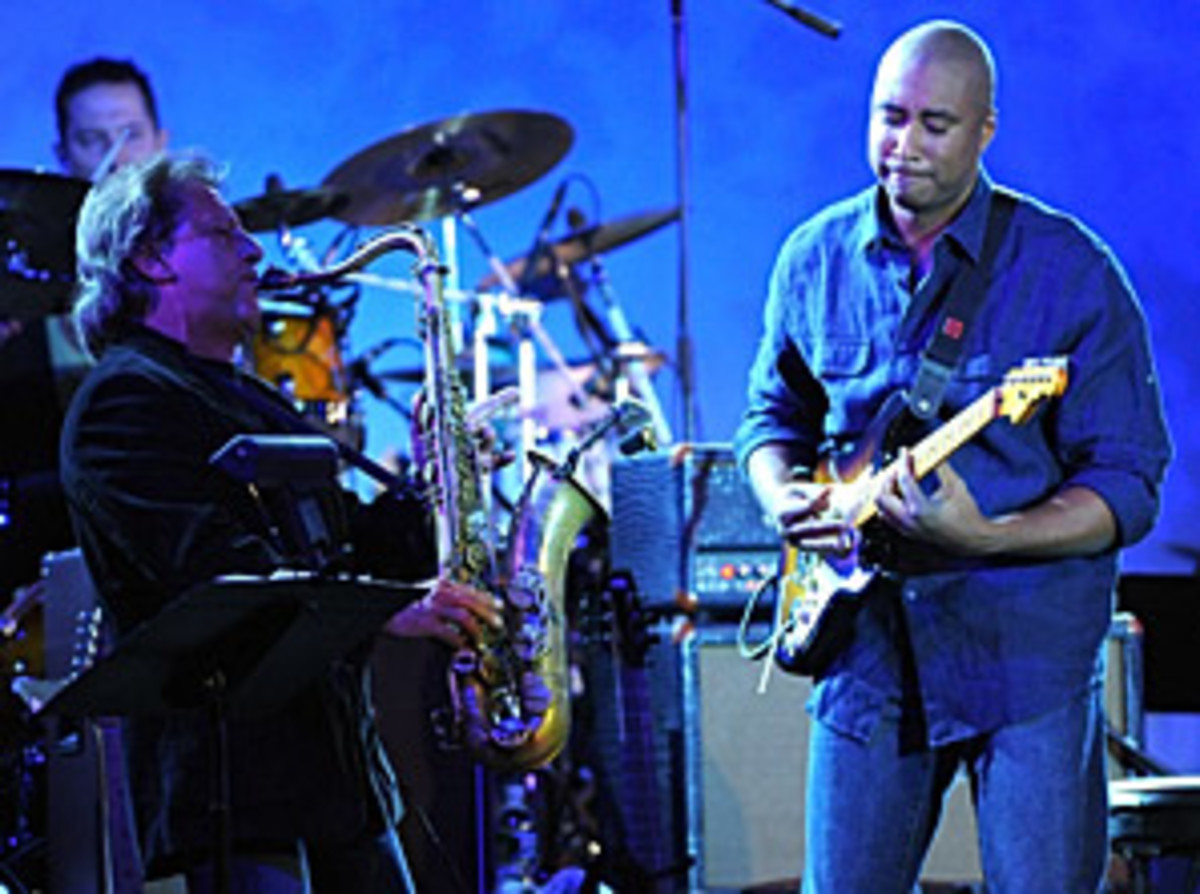Field of music throwing new challenges at Bernie Williams
On a Saturday night in April, a crowd of fawning Bernie Williams fans was treated to a lengthy video montage featuring highlights from his heyday as a Yankee. With every big hit, the audience roared with excitement. As the legendary voice of longtime Yankee Stadium announcer Bob Sheppard intoned "Number 51: Bernie Williams," the crowd's enthusiasm rose to a fever pitch.
When the montage reached its conclusion, a voice came over the loudspeaker and announced, "There's really only one way to introduce Bernie Williams." On cue, Bald Vinny, the king of the Bleacher Creatures, commenced the familiar chant: "Ber-nie Will-iams" clap-clap, clap-clap-clap. The rest of the audience immediately followed suit.
No, this scene didn't play out in Yankee Stadium, or anywhere else in the Bronx. It took place at the Nokia Theater in Times Square, where Williams, the former Yankees centerfielder who has embarked on a music career, performed songs from his new album, Moving Forward.
Though Williams, a five-time All-Star and four-time World Series champion with the Yankees, doesn't have a problem packing a house in New York, a professional athlete's pursuit of a second career, especially one in a creative field like music, inevitably raises problems. How do you start fresh after reaching the heights of fame and fortune? How do you persuade people to move beyond the perception that you're just a jock with a new hobby? How do you get people to take you seriously?
In fact, Williams, 40, has always been an athlete and a musician. The Puerto Rico native took his first guitar lesson at the age of eight and was talented enough to earn a spot at a performing arts high school in San Juan, where he studied classical guitar. Says Williams, "Most of the people I went to high school with ended up being professional musicians."
Even when Williams took what he calls the "rebel route" of playing baseball, he never turned in his guitar. "I was always playing," he says. "I took it everywhere." Even into the Yankees' locker room, where his musical stylings weren't always warmly received.
Williams' first album, The Journey Within, was released in 2003 on Grp Records. A mix of classical and jazz guitar infused with a touch of Latin flare, it met with an overwhelmingly positive reception, both critically and popularly. In recent years, he has continued to expand his horizons by taking classes in music theory at SUNY-Purchase. And though his second album shows him evolving as a musician and composer, the question remains how to conquer the whole perception thing, to get people to move beyond the notion that he's good musician -- for a ballplayer.
Williams is hardly the first to grapple with this issue. Attempting to succeed in both pro sports and music, two one-in-a-million careers, in the span of single a lifetime? That takes chutzpah. While many athletes -- from former big-league pitcher Jack McDowell to NBA superstar Shaquille O'Neal -- have dabbled in music, few have made a lasting mark. The most successful may be former NBA forward Wayman Tisdale, a bassist whose albums have topped Billboard's contemporary jazz charts.
In any post-sports career, challenges abound. Among former athletes who forged a second All-Star career, perhaps no one stands out more than Bill Bradley, the New York Knicks Hall of Famer who went on to spend 18 distinguished years as a U.S. Senator from New Jersey.
Says Bradley, "I had some notable advantages from basketball, one of which was I was in the homes and living rooms of millions of people -- a lot of them in New Jersey -- every Wednesday and Friday night on television. So they felt they knew me. Then, when I went to my first political events there would be 200 people there instead of 20. That gave me the opportunity to succeed or fail before 10 times as many people as somebody else would."
But while his celebrity may have earned Bradley his platform, it didn't automatically entitle him to the respect of his peers. According to Bradley, there were those who wrote him off as simply "audacious" while watching to see if he was going to "parade around" like an NBA celebrity. So he made the decision during his early years in the Senate that, unless prompted, talk of basketball was off-limits.
"You want to be a senator first," he says. "Then you have this interesting background."
Nine-year major league veteran Doug Glanville carved out a successful second career in real estate and also serves as a guest columnist for The New York Times. He says, "Anybody who's a competitor in this game, and odds are you're a very competitive personality, can't just be satisfied with cleaning out your garden."
However, despite athletes' inherently driven nature, Glanville says there are practical realities that get in the way of the attempt to transition to a new career. "You haven't made a résumé," he says. "You never interviewed, really. You really haven't done anything for so long other than play baseball or whatever sport it may be."
Glanville believes that Williams is the exception rather than the rule: "People like Bernie Williams -- they're [rare]. Extremely talented musician. Smart guy, done a lot of things. So you get the sense that Bernie Williams will be okay."
According to Olympic gold medal swimmer Nancy Hogshead-Makar, who has excelled in her post-Olympic career as a lawyer and professor at Florida Coastal School of Law, the key to moving on is to ask yourself, "What is the thing you find as compelling as your sport?"
Williams has a rare advantage here. He's always known the answer to that question: music. But while he may be able to identify his passion, even for a superstar athlete, "it's not like you can make a lateral move," as Glanville says. No matter what you do when you retire from a career in sports, former athletes note, you're going to start at the bottom.
Ultimately, while a retired athlete may have greater opportunities in other arenas thanks to his fame on the field, that doesn't guarantee him success. "As an aspiring musician, my notoriety as a baseball player can take me so far," Williams says. "After that it's whether or not you have the goods."
So when will Williams know that he has earned his stripes as a musician? "Music is submitted to a more subjective way of thinking than baseball," he says. "In baseball, your stats speak for themselves."
Williams says he'll feel he's made it in his new field when fellow musicians say, "We can take him as one of our own."
When that happens, maybe he'll be playing concerts simply as Bernie Williams, jazz musician. And he won't need an introduction by Bald Vinny.




































